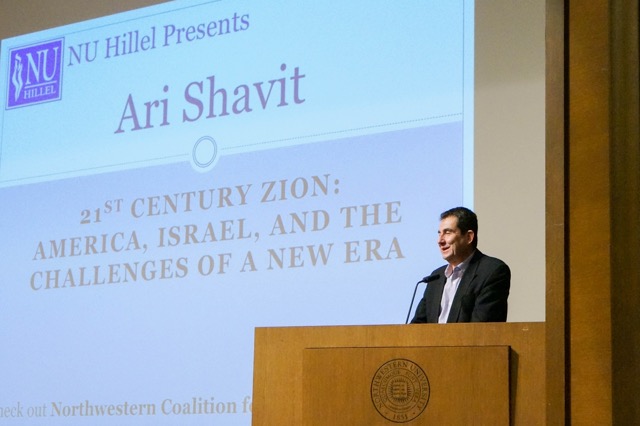
Photo by Phan Le / North by Northwestern
“Zionism in Israel has failed – it is not the social justice paradise we wanted. But today it is a thriving society, and one that should strive for peace,” said Ari Shavit Monday evening to a large crowd in Ryan Auditorium.
The Israeli journalist spoke about his book, his views on the Israeli-Palestinian conflict and historical context of the region.
Weinberg junior Ariella Hoffman-Peterson opened for the speaker and talked about her conversation with Shavit about being Jewish and caring about both sides of the Israeli-Palestinian conflict.
Shavit began by speaking about his book, and wanted to give the audience context to the state of modern Israel.
“Jews were the ultimate ‘others’ of white Europe,” he said, claiming that Israel came too late. “If it had existed 10 years earlier, millions of lives would have been saved.”
Historically, he talked about the civil war of 1948 between Jewish and Arab Israelis, with deaths on both sides. Contemporarily, he talked about the clash between Israel and Gaza during the summer of 2014.
Shavit condemned the occupation of the West Bank, and called for the necessity of a new peace doctrine.
Shavit said he supports a two-state solution as the best answer for both sides, but said extremists on both sides are preventing this from happening peacefully, if at all. The speech shifted towards attempts to end occupation, and trying to connect Gaza with the West Bank to make a unified Palestinian state.
Though he criticized his country and its far-right leaders, he said he was optimistic about the future. Shavit called upon Jewish youth, both in America and overseas, to bring Israel back to its roots.
“Our mission is to prove that you can have a Jewish democratic state as a beacon of freedom and human rights,” he said.
A Q-and-A session followed the speech. Questions ranged from Benjamin Netanyahu to Europe’s relation with Israel to a three-state solution.
When questioned about the treatment of Arab Israelis, Shavit said the country’s government failed in giving all of its citizens fair treatment, but that they need to commit to making everything “equal, open and integrated” for all citizens, as a democracy. He also praised the vibrancy of the American Jewish community.
“Israel is a man made miracle, but the ability of [the American Jewish Community] to create a modern diaspora – a universe built on voluntary values – is a miracle as well,” he said.
Suzanne Chen, a SESP freshman, says she didn’t know much about the conflict coming in, but learned a lot about the issue.
“I appreciated that the speaker was talking about an issue so close to his heart, but was still able to admit the terrible things Israel has done,” she said. “A lot of people just brush over the things that make them uncomfortable with their country, but he confronted the issues, and tried to find a solution for all people.”
Tina Umanskiy, a senior RTVF student and spokesperson for the Northwestern Coalition for Peace spoke after the event addressing the NUDivest campaign that had been brought up last week. She criticized the movement for its attitudes towards education and dialogue.
“The [larger BDS] campaign sends a strong political message by divesting from Israel and having historical knowledge about the occupation is absolutely necessary,” Umanskiy said. “As an American Jewish community, it’s important to criticize Israel, but we can still love it. To really love and value Israel, we need to be able to recognize its flaws.”
She said that this means she doesn’t support or reject any of Israel’s decisions before getting as much information as possible. She emphasized that context is crucial, but this doesn’t justify all of Israel’s actions.
“Israel can do better, and we want to move forward on this issue on campus. It’ll take conversation and dialogue on both sides.”
Correction, Jan. 28: This piece was edited to clarify that Shavit only explicitly condemned Israeli occupation of the West Bank, not that of Gaza.